人教版(PEP) 小升初总复习—时态 课件(23张PPT)
文档属性
| 名称 | 人教版(PEP) 小升初总复习—时态 课件(23张PPT) | 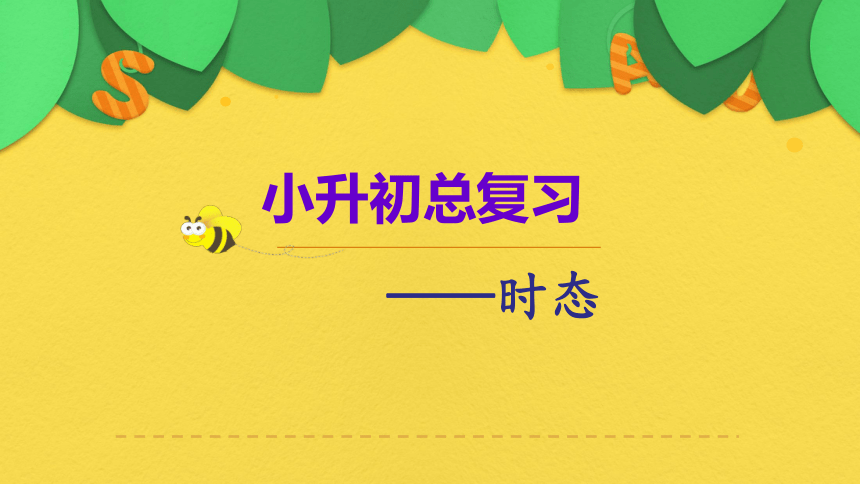 | |
| 格式 | zip | ||
| 文件大小 | 931.6KB | ||
| 资源类型 | 教案 | ||
| 版本资源 | 人教版(PEP) | ||
| 科目 | 英语 | ||
| 更新时间 | 2022-06-20 15:02:33 | ||
图片预览

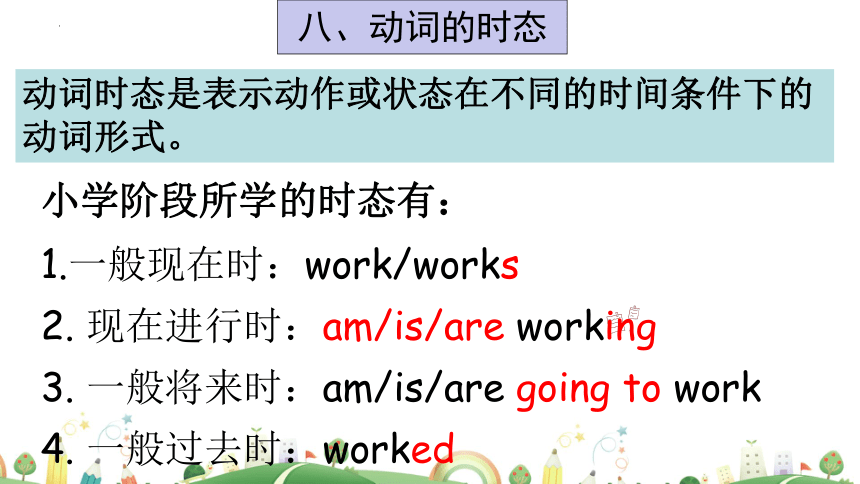
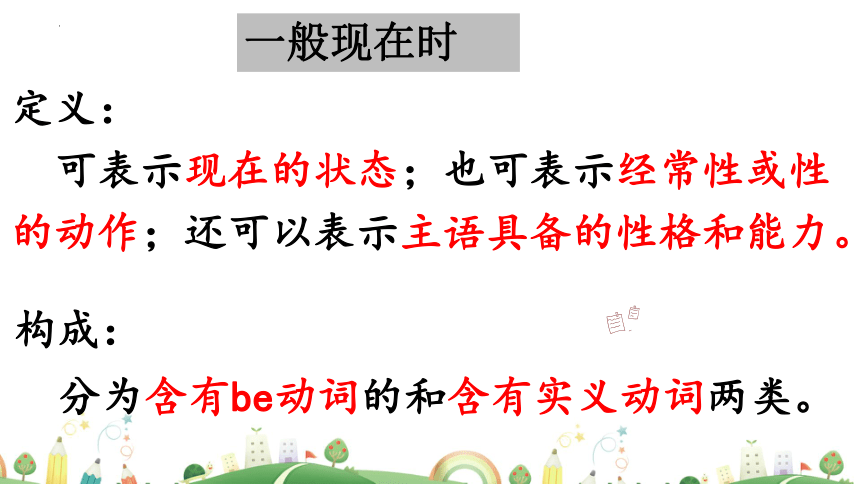
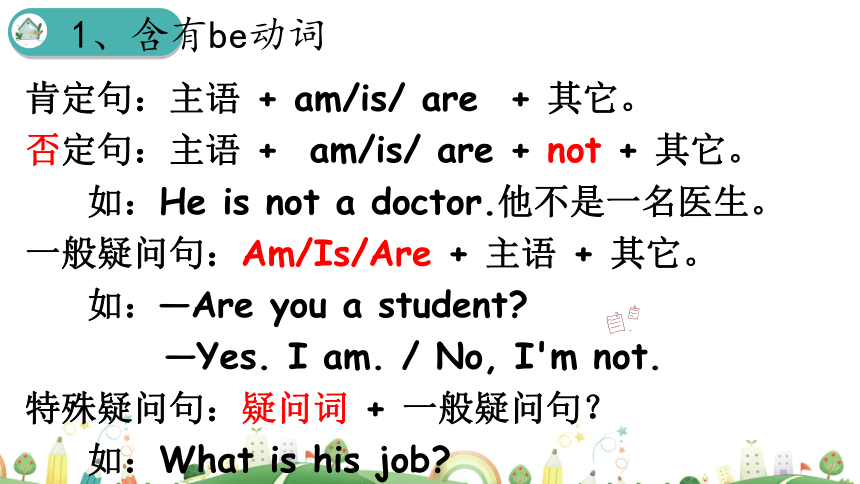
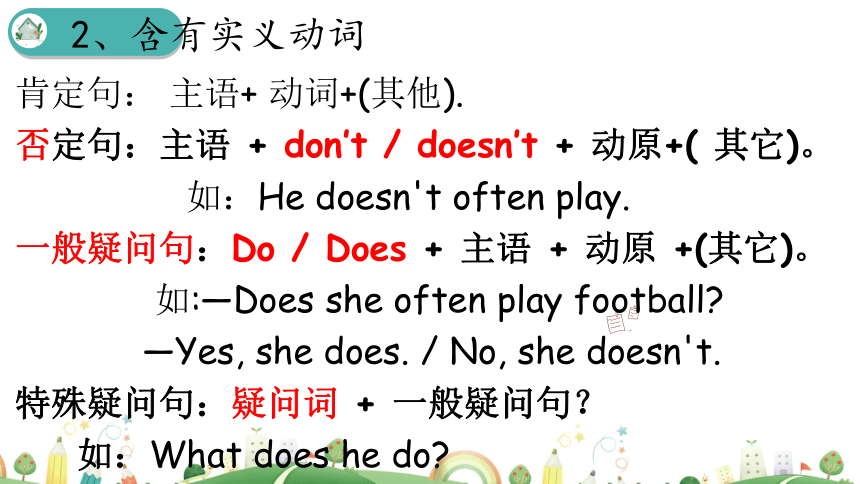
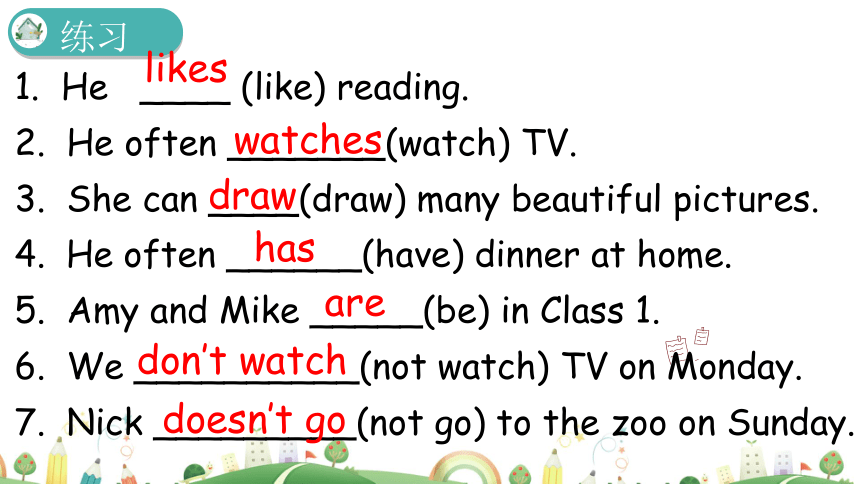
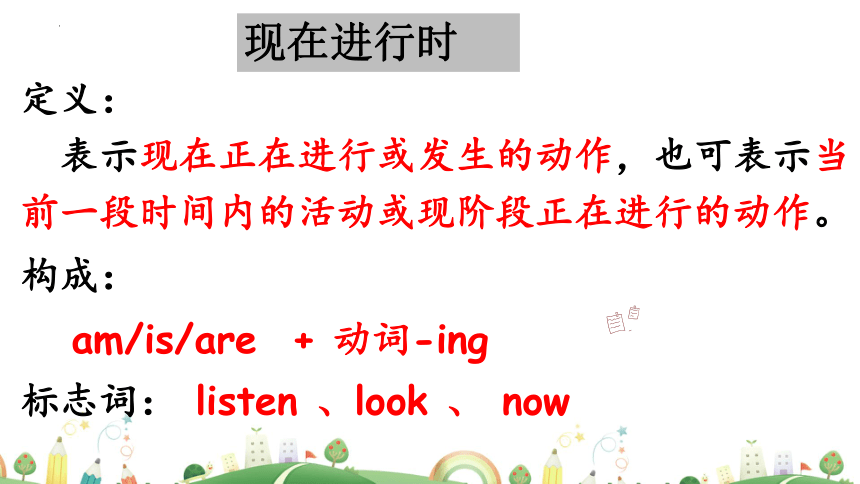
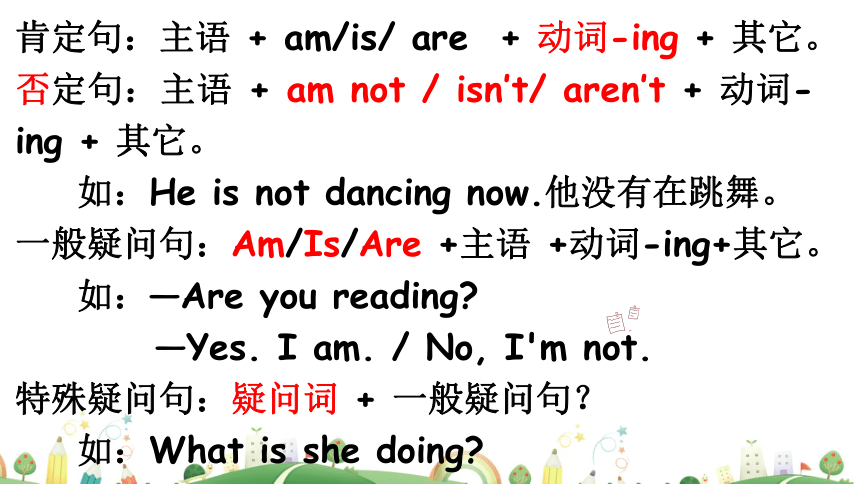
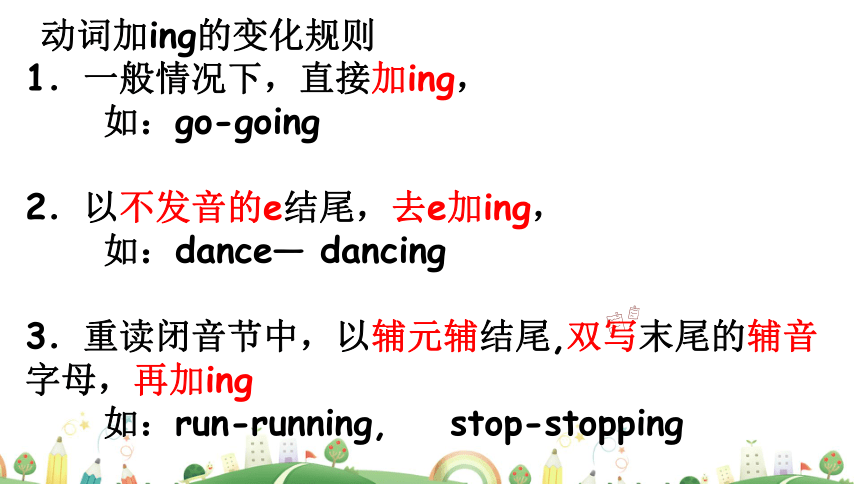
文档简介
(共23张PPT)
小升初总复习
——时态
八、动词的时态
动词时态是表示动作或状态在不同的时间条件下的动词形式。
小学阶段所学的时态有:
一般现在时:work/works
2. 现在进行时:am/is/are working
3. 一般将来时:am/is/are going to work
4. 一般过去时:worked
定义:
可表示现在的状态;也可表示经常性或性
的动作;还可以表示主语具备的性格和能力。
一般现在时
构成:
分为含有be动词的和含有实义动词两类。
1、含有be动词
肯定句:主语 + am/is/ are + 其它。
否定句:主语 + am/is/ are + not + 其它。
如:He is not a doctor.他不是一名医生。
一般疑问句:Am/Is/Are + 主语 + 其它。
如:—Are you a student
—Yes. I am. / No, I'm not.
特殊疑问句:疑问词 + 一般疑问句?
如:What is his job
肯定句: 主语+ 动词+(其他).
否定句:主语 + don’t / doesn’t + 动原+( 其它)。
如:He doesn't often play.
一般疑问句:Do / Does + 主语 + 动原 +(其它)。
如:—Does she often play football
—Yes, she does. / No, she doesn't.
特殊疑问句:疑问词 + 一般疑问句?
如:What does he do
2、含有实义动词
练习
1. He ____ (like) reading.
2. He often _______(watch) TV.
3. She can ____(draw) many beautiful pictures.
4. He often ______(have) dinner at home.
5. Amy and Mike _____(be) in Class 1.
6. We __________(not watch) TV on Monday.
7. Nick _________(not go) to the zoo on Sunday.
likes
watches
draw
has
are
don’t watch
doesn’t go
现在进行时
定义:
表示现在正在进行或发生的动作,也可表示当
前一段时间内的活动或现阶段正在进行的动作。
构成:
am/is/are + 动词-ing
标志词: listen 、look 、 now
肯定句:主语 + am/is/ are + 动词-ing + 其它。
否定句:主语 + am not / isn’t/ aren’t + 动词-ing + 其它。
如:He is not dancing now.他没有在跳舞。
一般疑问句:Am/Is/Are +主语 +动词-ing+其它。
如:—Are you reading
—Yes. I am. / No, I'm not.
特殊疑问句:疑问词 + 一般疑问句?
如:What is she doing
动词加ing的变化规则
1.一般情况下,直接加ing,
如:go-going
2.以不发音的e结尾,去e加ing,
如:dance— dancing
3.重读闭音节中,以辅元辅结尾,双写末尾的辅音字母,再加ing
如:run-running, stop-stopping
一、写出下列动词的现在分词:
run_______ swim _______ make______
begin_____ go________ like________ write______ shop ______ have ______
sing ______ dance ______ put________ see_______ love_______ live_______ take_______ come _____ get _______
stop_______ sit ________
1. He _________(water) the trees now.
2. Look!she _______(sing) in the classroom.
3. What ____ you ______(do) now
4. The boy _______( draw) a picture now.
5. My mother ________( cook ) some fish now.
6. Look !They _________( have) an atr lesson.
7. The students ________(clean) the classrom .
练习
is watering
is singing
are doing
is drawing
is cooking
are having
are cleaning
一般将来时
定义:
表示将要发生的动作或存在的状态及 打算、计划或预备做某事。
构成:①be going to do;
②will do.
标志词: next week、tomorrow、tonight
1、be going to结构
肯定句:主语 + am/is/are going to+动原+其它。
否定句:主语+am/is/are not going to+动原+其它。
如:He is not going to swim.他将不游泳了。
一般疑问句:Am/Is/Are +主语+going to+动原.
如:—Are you going to see a fim
—Yes. I am. / No, I'm not.
特殊疑问句:疑问词 + 一般疑问句?
如:What is he going to do
2、will/shall型
肯定句:主语 + will+动原+其它。
否定句:主语+will not +动原+其它。
如:He will not swim.他将不游泳了。
一般疑问句:Will +主语++动原
如:—Will you see a fim
—Yes. I will. / No, I will not.
特殊疑问句:疑问词 + 一般疑问句?
如:What will he do
1. My brother ________ (come) back next week.
2. I _______(go) to bed early toninght.
3. What ___she ________ (do) next weekend
4. They __________(go) to Shanghai next week.
5. My mother ________( cook ) fish tonight.
6. They are going to______( have) an atr lesson.
7. He will ____(clean) the classrom after school.
练习
will come
will go
is going to do
will go
will cook
have
clean
一般过去时
定义:
表示过去某个时间或某段时间内发生的动作或存在的状态。
构成:①be动词型;
②实义动词型.
标志词: last weekend、yesterday、
the day before yesterday
1、be动词型
肯定句:主语 + was/ were+其它。
否定句:主语 + was/ were + not + 其它。
如:He was not a doctor.他不是一名医生。
一般疑问句:Was/ Were + 主语 + 其它。
如:—Were you a student last year
—Yes. I was. / No, I was not.
特殊疑问句:疑问词 + 一般疑问句?
如:What was his job last month
肯定句: 主语+ 动词过去式+(其他).
否定句:主语 + didn’t + 动原+( 其它)。
如:He didn’t often play football.
一般疑问句:Did + 主语 + 动原 +(其它)。
如:—Did she often play football
—Yes, she did. / No, she didn't.
特殊疑问句:疑问词 + 一般疑问句?
如:What did he do
2、实义动词型
动词过去式变化规则:
1.一般在动词末尾加-ed 如:work—worked
2.不发音e结尾,加d, 如:live--lived
3.在重读闭音节中,以辅元辅结尾,双写辅音字母,再加- ed 如:stop-stopped
4.以“辅音字母+ y”结尾的,变y为i,再加-ed,如:study-studied
不规则变化:
详见名师复习74页
详见六年级下册英语课本69页。
写出下列动词的过去式:
is are do see
say give get go
come have eat take
run sing put make
read write draw drink
swim sit
1. They ___ (go / went) shopping yesterday.
2. She __(buys / bought ) a new book yesterday.
3. Jim ______ (be)very happy last night
4. She _____(go) to school at 7:00 every day.
5. Yesterday she ____( go) to school at7:20.
6. I _____( study) English at home yesterday.
7. He ______(read) a book last night.
练习
was
goes
went
studied
read
1. It ____ (be) Mike’s birthday last Friday.
2. We all ____ (have) a good time last night.
3. She _____a book yesterday. (read)
4. Jim didn’t ____(go) home yesterday.
5. I didn’t ____ ( feel ) very well yesterday .
6. Both he and I _____ (be) teachers last year.
7. - ___you ___(read) a book last night
-Yes, I did.
练习
was
had
read
go
feel
were
read
Did
小升初总复习
——时态
八、动词的时态
动词时态是表示动作或状态在不同的时间条件下的动词形式。
小学阶段所学的时态有:
一般现在时:work/works
2. 现在进行时:am/is/are working
3. 一般将来时:am/is/are going to work
4. 一般过去时:worked
定义:
可表示现在的状态;也可表示经常性或性
的动作;还可以表示主语具备的性格和能力。
一般现在时
构成:
分为含有be动词的和含有实义动词两类。
1、含有be动词
肯定句:主语 + am/is/ are + 其它。
否定句:主语 + am/is/ are + not + 其它。
如:He is not a doctor.他不是一名医生。
一般疑问句:Am/Is/Are + 主语 + 其它。
如:—Are you a student
—Yes. I am. / No, I'm not.
特殊疑问句:疑问词 + 一般疑问句?
如:What is his job
肯定句: 主语+ 动词+(其他).
否定句:主语 + don’t / doesn’t + 动原+( 其它)。
如:He doesn't often play.
一般疑问句:Do / Does + 主语 + 动原 +(其它)。
如:—Does she often play football
—Yes, she does. / No, she doesn't.
特殊疑问句:疑问词 + 一般疑问句?
如:What does he do
2、含有实义动词
练习
1. He ____ (like) reading.
2. He often _______(watch) TV.
3. She can ____(draw) many beautiful pictures.
4. He often ______(have) dinner at home.
5. Amy and Mike _____(be) in Class 1.
6. We __________(not watch) TV on Monday.
7. Nick _________(not go) to the zoo on Sunday.
likes
watches
draw
has
are
don’t watch
doesn’t go
现在进行时
定义:
表示现在正在进行或发生的动作,也可表示当
前一段时间内的活动或现阶段正在进行的动作。
构成:
am/is/are + 动词-ing
标志词: listen 、look 、 now
肯定句:主语 + am/is/ are + 动词-ing + 其它。
否定句:主语 + am not / isn’t/ aren’t + 动词-ing + 其它。
如:He is not dancing now.他没有在跳舞。
一般疑问句:Am/Is/Are +主语 +动词-ing+其它。
如:—Are you reading
—Yes. I am. / No, I'm not.
特殊疑问句:疑问词 + 一般疑问句?
如:What is she doing
动词加ing的变化规则
1.一般情况下,直接加ing,
如:go-going
2.以不发音的e结尾,去e加ing,
如:dance— dancing
3.重读闭音节中,以辅元辅结尾,双写末尾的辅音字母,再加ing
如:run-running, stop-stopping
一、写出下列动词的现在分词:
run_______ swim _______ make______
begin_____ go________ like________ write______ shop ______ have ______
sing ______ dance ______ put________ see_______ love_______ live_______ take_______ come _____ get _______
stop_______ sit ________
1. He _________(water) the trees now.
2. Look!she _______(sing) in the classroom.
3. What ____ you ______(do) now
4. The boy _______( draw) a picture now.
5. My mother ________( cook ) some fish now.
6. Look !They _________( have) an atr lesson.
7. The students ________(clean) the classrom .
练习
is watering
is singing
are doing
is drawing
is cooking
are having
are cleaning
一般将来时
定义:
表示将要发生的动作或存在的状态及 打算、计划或预备做某事。
构成:①be going to do;
②will do.
标志词: next week、tomorrow、tonight
1、be going to结构
肯定句:主语 + am/is/are going to+动原+其它。
否定句:主语+am/is/are not going to+动原+其它。
如:He is not going to swim.他将不游泳了。
一般疑问句:Am/Is/Are +主语+going to+动原.
如:—Are you going to see a fim
—Yes. I am. / No, I'm not.
特殊疑问句:疑问词 + 一般疑问句?
如:What is he going to do
2、will/shall型
肯定句:主语 + will+动原+其它。
否定句:主语+will not +动原+其它。
如:He will not swim.他将不游泳了。
一般疑问句:Will +主语++动原
如:—Will you see a fim
—Yes. I will. / No, I will not.
特殊疑问句:疑问词 + 一般疑问句?
如:What will he do
1. My brother ________ (come) back next week.
2. I _______(go) to bed early toninght.
3. What ___she ________ (do) next weekend
4. They __________(go) to Shanghai next week.
5. My mother ________( cook ) fish tonight.
6. They are going to______( have) an atr lesson.
7. He will ____(clean) the classrom after school.
练习
will come
will go
is going to do
will go
will cook
have
clean
一般过去时
定义:
表示过去某个时间或某段时间内发生的动作或存在的状态。
构成:①be动词型;
②实义动词型.
标志词: last weekend、yesterday、
the day before yesterday
1、be动词型
肯定句:主语 + was/ were+其它。
否定句:主语 + was/ were + not + 其它。
如:He was not a doctor.他不是一名医生。
一般疑问句:Was/ Were + 主语 + 其它。
如:—Were you a student last year
—Yes. I was. / No, I was not.
特殊疑问句:疑问词 + 一般疑问句?
如:What was his job last month
肯定句: 主语+ 动词过去式+(其他).
否定句:主语 + didn’t + 动原+( 其它)。
如:He didn’t often play football.
一般疑问句:Did + 主语 + 动原 +(其它)。
如:—Did she often play football
—Yes, she did. / No, she didn't.
特殊疑问句:疑问词 + 一般疑问句?
如:What did he do
2、实义动词型
动词过去式变化规则:
1.一般在动词末尾加-ed 如:work—worked
2.不发音e结尾,加d, 如:live--lived
3.在重读闭音节中,以辅元辅结尾,双写辅音字母,再加- ed 如:stop-stopped
4.以“辅音字母+ y”结尾的,变y为i,再加-ed,如:study-studied
不规则变化:
详见名师复习74页
详见六年级下册英语课本69页。
写出下列动词的过去式:
is are do see
say give get go
come have eat take
run sing put make
read write draw drink
swim sit
1. They ___ (go / went) shopping yesterday.
2. She __(buys / bought ) a new book yesterday.
3. Jim ______ (be)very happy last night
4. She _____(go) to school at 7:00 every day.
5. Yesterday she ____( go) to school at7:20.
6. I _____( study) English at home yesterday.
7. He ______(read) a book last night.
练习
was
goes
went
studied
read
1. It ____ (be) Mike’s birthday last Friday.
2. We all ____ (have) a good time last night.
3. She _____a book yesterday. (read)
4. Jim didn’t ____(go) home yesterday.
5. I didn’t ____ ( feel ) very well yesterday .
6. Both he and I _____ (be) teachers last year.
7. - ___you ___(read) a book last night
-Yes, I did.
练习
was
had
read
go
feel
were
read
Did
